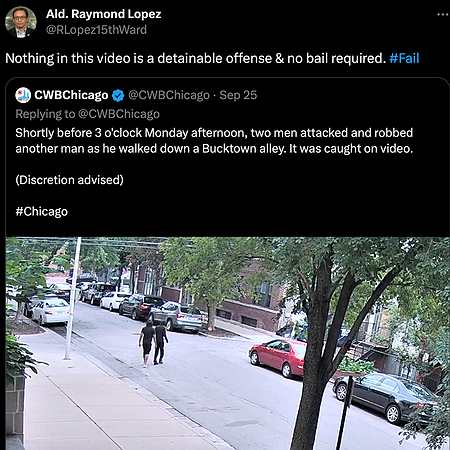Cook County Sheriff Tom Dart Spreads Disinformation about Electronic Monitoring Reforms
Following the arrest of a man awaiting trial on electronic monitoring, Sheriff Dart claimed his office was unable to track his whereabouts because of the essential movement provisions of the Pretrial Fairness Act.
The Briefing

Cook County Sheriff Tom Dart recently exploited an opportunity to use an unusual case to spread multiple falsities and stoke fear about pretrial electronic monitoring.
When interviewed about a man accused of murder who was on Sheriff’s electronic monitoring when accused of a new gun possession case, Sheriff Dart intentionally lied about electronic monitoring reforms. The Sheriff suggested that he is prohibited from tracking people while they’re on essential movement, calling it “two days of free movement.”
Contrary to Sheriff Dart’s statements, nothing in the Pretrial Fairness Act requires that people are not tracked during essential movement. In fact, the Sheriff’s office is continually tracking everyone’s location during essential movement in real-time using GPS technology. If someone breaks electronic monitoring rules, law enforcement is able to respond immediately, investigate alleged violations, and take people who are committing new offenses into custody.
In an attempt to elicit fear, Dart suggested that many people on electronic monitoring are being accused of committing violence. He also stated that pretrial electronic monitoring is not working. “I could give you hundreds of cases of people who while on free movement have committed new crimes,” said Dart.
Since taking effect in 2022, the electronic monitoring provisions of the Pretrial Fairness Act have been incredibly successful. Ensuring people on electronic monitoring are able to go grocery shopping, attend doctor’s appointments, and apply for jobs increases community safety. Removing these provisions would violate basic human rights principles by returning to a system that locked people in their homes with no way to access food or other necessities.
For years, the Cook County Sheriff’s Office denied people on electronic monitoring the ability to contribute to their households, perform life-affirming tasks, and even access healthcare. The electronic monitoring reforms in the Pretrial Fairness Act are intentionally designed to correct that history. Even under the new law, current Sheriff’s Office policy prevents people in apartment buildings from doing laundry or checking their mail in common areas of the building without the kind of movement permission the Sheriff is now attacking.
The Pretrial Fairness Act & EM in Cook County
The Pretrial Fairness Act allows people to have movement twice a week to take care of basic needs such as buying food and doing laundry. Each electronic monitoring program in the state can choose how to implement that requirement. The Cook County Sheriff’s Office chose to implement this law by allowing each person two, eight-hour periods of time per week to take care of their basic needs.
Between January and March 2022, less than 1% of people were re-arrested while on essential movement time. 99% of people utilized this movement without any issues.
Nothing in the SAFE-T Act or any other law requires the CCSO not to track people during the time they are on essential movement. Every person on CCSO EM is on a GPS ankle monitor, and those GPS monitors continue to record people’s exact location the entire time they are outside of their home. You can read the provision of the SAFE-T Act that authorizes essential movement at 730 ILCS 5/5-8A-4(A-1). Before these reforms were implemented, the lack of movement caused immense harm to people on CCSO electronic monitoring, as detailed in the recent report submitted to the Cook County board by CGL Industries and Chicago Appleseed Center for Fair Courts. (See page 47 here for discussion of harms of lack of movement.)
Most people on electronic monitoring are accused of non-violent offenses.
75% of people on electronic monitoring are accused of charges that do not allege harm or threat of harm to another person.
There is no connection between people on electronic monitoring and violence.
Between January 2016 and June 2020, 91% of people on electronic monitoring in Chicago were not re-arrested for any crime. Only 1.75% of people were re-arrested for a serious felony (Class 2 or higher).The University of Chicago Crime Lab found that in 2021, there were just three arrests of individuals on electronic monitoring for allegedly committing a homicide or shootings—out of almost 4,500 homicides and shootings that year.







